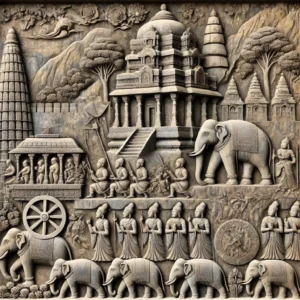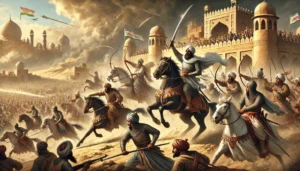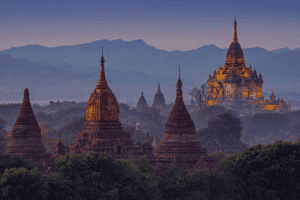
Atal Bihari Vajpayee was a leader whose legacy transcends political boundaries, earning him admiration across India and the world. A statesman, poet, and orator par excellence, Vajpayee’s life was dedicated to the service of his nation. His tenure as India’s Prime Minister and his contribution to the country’s political and cultural fabric remain unmatched.
Early Life and Education
Born on December 25, 1924, in Gwalior, Madhya Pradesh, Atal Bihari Vajpayee was the son of Krishna Devi and Krishna Bihari Vajpayee, a teacher and poet. Inspired by his father, Vajpayee displayed a love for literature early in life. He pursued a degree in political science and law from Victoria College (now Maharani Laxmi Bai College) and DAV College, Kanpur.
Vajpayee’s journey into politics began during the Quit India Movement in 1942, where he actively participated in the struggle against British rule. His association with the Rashtriya Swayamsevak Sangh (RSS) in his youth profoundly influenced his ideology, instilling in him discipline and a commitment to nationalism.
Political Journey
The Parliamentarian and Orator
Atal Bihari Vajpayee first entered Parliament in 1957, winning a seat from Balrampur, Uttar Pradesh. His exceptional oratory skills quickly made him a prominent figure. Even India’s first Prime Minister, Jawaharlal Nehru, remarked that Vajpayee would one day lead the nation.
President of Bharatiya Jana Sangh
In 1968, Vajpayee became the President of the Bharatiya Jana Sangh (BJS), leading the party through turbulent times and strengthening its base. His principled opposition to the Emergency (1975–1977) declared by Indira Gandhi, which curtailed democratic freedoms, showcased his commitment to democracy.
Co-founding the Bharatiya Janata Party (BJP)
In 1980, Vajpayee co-founded the Bharatiya Janata Party (BJP) with Lal Krishna Advani and others. As the party’s first president, he envisioned a progressive, inclusive India. Under his leadership, the BJP became a formidable force in Indian politics.
Prime Ministerial Tenure
Vajpayee served as Prime Minister three times: briefly in 1996, from 1998 to 1999, and then from 1999 to 2004. His leadership was marked by landmark achievements in diplomacy, economy, and governance.
First Term (1996)
In May 1996, Vajpayee became Prime Minister for the first time, though his government lasted only 13 days due to a lack of majority in Parliament.
Second Term (1998–1999)
In 1998, Vajpayee returned as Prime Minister and led India into a historic era with the Pokhran-II nuclear tests, showcasing India’s nuclear capabilities. Despite international sanctions, his government effectively handled the economic and diplomatic challenges that followed.
Vajpayee also prioritized peace with Pakistan. The Lahore Summit (1999) was a bold step toward resolving Indo-Pak conflicts. However, the goodwill was tested during the Kargil War, where Vajpayee’s leadership bolstered national unity and India’s global image.
Third Term (1999–2004)
Elected again in 1999, Vajpayee became the first non-Congress Prime Minister to complete a full five-year term.
- Infrastructure Revolution: The Golden Quadrilateral highway project transformed India’s connectivity and economic potential.
- Economic Reforms: Vajpayee’s government pursued liberalization, disinvestment in public sector enterprises, and policies that boosted GDP growth.
- Education for All: The Sarva Shiksha Abhiyan was launched to improve education access and literacy across India.
The Poet and Philosopher
Beyond politics, Atal Bihari Vajpayee was a gifted poet whose works reflect his introspection, resilience, and humanity. His poems touched on themes of courage, nationalism, and life’s complexities.
- Resilience in Adversity:
His iconic poem, “Maut Se Than Gayi” (A Tryst with Death), written during a critical illness, exemplifies his indomitable spirit. “Jeevan ke har mod par, milegi maut ki ghaatiyan.
Jeevan se haar mat, kar jindagi ki baat.” - Nationalism:
In his poem “Geet Naya Gata Hoon”, Vajpayee expressed his unwavering optimism for India’s future. - Philosophy and Reflection:
His works like “Kadam Milakar Chalna Hoga” emphasize inclusivity and collective effort for progress.
Vajpayee often infused poetry into his speeches, blending politics and art to inspire millions.
Legacy and Honors
Atal Bihari Vajpayee retired from active politics in 2005 due to health issues but remained a guiding light for the BJP and India. In 2015, he was awarded the Bharat Ratna, India’s highest civilian honor, recognizing his contribution to the nation. His birthday, December 25, is observed as Good Governance Day.
On August 16, 2018, Vajpayee passed away, leaving behind a legacy of leadership marked by integrity, vision, and compassion. His life’s work continues to inspire future generations.
Atal Bihari Vajpayee was more than a politician; he was a statesman, a poet, and a patriot. His contributions to India’s political, economic, and cultural landscape make him one of the most respected leaders in Indian history. Whether through his governance, his eloquent speeches, or his profound poetry, Vajpayee remains an enduring symbol of courage, resilience, and hope






